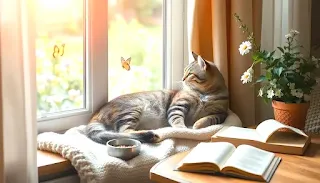The Importance of Senior Cat Care
Cats are surviving longer than ever before. Many reach 15, 18, or even 20 years with adequate care. That means more older felines require particular treatment. When a cat matures, their requirements vary. They need tailored nourishment, health checkups, and a pleasant atmosphere to be happy. Proper care now might ensure a more pleasant life for your pet buddy. In this post, you'll discover how to care for your aging cat with diet, health checks, environment modifications, and emotional support.
Understanding the Aging Cat: Recognizing Signs and Changes
Common Signs of Aging in Cats
As cats get older, they express their age in numerous ways. You may notice they move more slowly or prefer naps over play. Their weight could fluctuate abruptly, and grooming might become less regular. Eyes may grow hazy, or their hearing can decrease. Dental difficulties or difficulty leaping on preferred locations might also occur. Staying vigilant helps spot difficulties early before they become huge ones.
Typical Health Concerns in Senior Cats
Many common health conditions afflict elderly cats. Arthritis typically causes stiffness and pain. Kidney illness might creep up and present as increased water consumption or weight loss. Hyperthyroidism speeds up their metabolism, making them underweight despite eating healthily. Dental problems may cause discomfort and impede eating. Regular vet visits can discover these concerns early and keep your cat happy.
How Aging Affects a Cat's Behavior
Older cats prefer to sleep more and may exhibit less interest in toys or outside experiences. They can become less sociable or hide more frequently. Some display indicators of cognitive deterioration, such as forgetting basic routines or becoming confused quickly. Recognizing these habits might help you determine whether they require extra assistance or medical intervention.
Nutrition and Diet for Senior Cats
Adjusting Diet for Aging Cats
Feeding a geriatric cat involves more than just a dish of standard food. Look for meals particularly prepared for senior cats that are simpler to digest. These generally have extra nutrients to benefit aging bodies. Foods rich in omega-3 fatty acids and antioxidants help keep joints and immune systems robust. Check labels and chat with your vet about the best alternatives.
Managing Weight and Preventing Obesity
Obesity may make health conditions worse in elderly cats. Portion control is crucial. Use smaller dishes and keep to a feeding schedule. Avoid free-feeding—instead, serve measured meals. Regular weight checks help you discover issues early. Keeping your cat groomed relieves stress on aging joints and enhances mobility.
Hydration and Dental Health
Older cats generally consume less water, causing dehydration. Provide lots of fresh water in several areas. You may also add moist meals to boost fluid consumption. Dental health matters too; pick dental treats or meals that help avoid gum disease. Regular dental checkups keep their mouths healthy and pain-free.
Health Monitoring and Veterinary Care
Regular Veterinary Checkups
Bi-annual or yearly vet checkups are required. These check-ups include blood testing, urine tests, and dental examinations. Early diagnosis of diseases provides you a greater opportunity to address health difficulties. Keep a health record to document changes over time.
Recognizing Signs of Illness
Watch for unexpected behavior alterations, such as hiding or reluctance to eat. Unexplained weight loss or excessive thirst might also suggest concern. If your cat displays these indicators, don’t delay—obtain veterinary treatment. Quick action may make a tremendous impact.
Preventive Health Measures
Vaccinations should be kept current. Use flea, tick, and worm preventives routinely. Dental maintenance and cleanings also safeguard general wellness. Some cats could benefit from vitamins or drugs, but always check with your doctor before introducing anything new to their regimen.
Creating a Safe and Comfortable Environment
Modifying the Living Space
Make your house senior-friendly. Keep litter boxes, food, and water in easy-to-reach areas. Soft bedding and warm areas stimulate slumber. Ramps or steps improve mobility if your cat struggles with high locations. Removing risks like unsecured cables or slick flooring keeps your kitten safe.
Environmental Enrichment
Gentle play and cerebral tasks keep their brains alert. Use toys that don’t need a lot of energy yet excite their senses. Window perches help children enjoy the outdoors securely. Remember, an active mind keeps boredom and sadness away.
Managing Sensory Decline and Cognitive Health
Loud sounds or rapid changes might confuse an older cat. Keep routines constant and silent. Use familiar things and familiar fragrances to relieve stress. Interactive toys and relaxing aids may help their mental well-being.
Supporting Your Senior Cat’s Emotional Well-being: Building a Bond and Providing Comfort
Spend peaceful time grooming or snuggling when they wish. Respect their need for solitude—some prefer being alone. Your presence brings security, making them feel loved and protected. Small gestures, like chatting quietly, create trust.
Addressing Cognitive Decline
Signs include forgetting where the litter box is or walking aimlessly. Products like puzzle feeders and relaxing sprays may assist mental wellness. These technologies engage their brain and lessen anxiety. Always visit your vet for personalized guidance.
Monitoring Behavioral Changes
Notice variations in their behaviors and emotions. Are they eating less or withdrawing? These could be symptoms of medical difficulties rather than merely aging. Seek guidance from pet specialists if you’re uncertain. Early intervention keeps them comfortable longer.
Conclusion: Ensuring a Fulfilling Life for Your Senior Cat
Caring for an aged cat requires more than simply addressing basic necessities. It’s about adjusting their food, guaranteeing frequent health checkups, and establishing a quiet atmosphere. These actions help your kitty buddy remain active, comfortable, and cherished throughout their golden years. Your meticulous care makes all the difference in providing your senior cat the best life possible. Keep observant, keep proactive, and appreciate those quiet, loving moments. With your guidance, your cat’s older years will be full of comfort and friendship.

